The SSD Relapse: Understanding and Choosing the Best SSD
by Anand Lal Shimpi on August 30, 2009 12:00 AM EST- Posted in
- Storage
OCZ Gets Clever: Agility vs. Vertex, Even Cheaper Indilinx SSDs
Samsung makes SSDs for OEMs, Samsung sells pre-made SSDs to companies like OCZ and Corsair and Samsung also makes NAND flash. Samsung actually made all of the flash that was used in the first generation of Indilinx SSDs. Unfortunately, prices went up.
OCZ was quick to adapt and started making Indilinx drives using flash from different manufacturers. This is the OCZ Vertex, we’re all familiar with it:
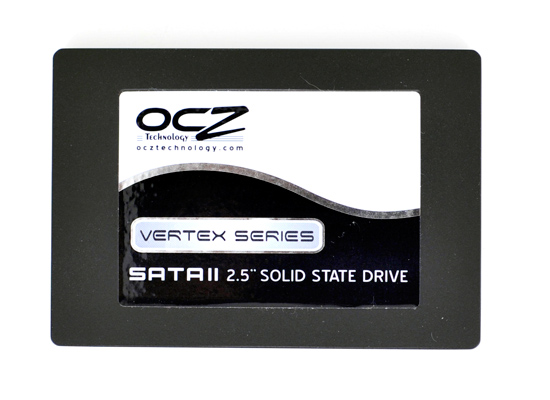
This is the OCZ Agility. You get the same controller as the Vertex, but with either Intel 50nm or Toshiba 40nm flash:
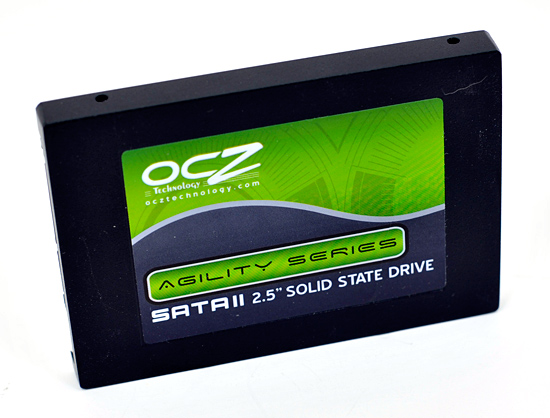
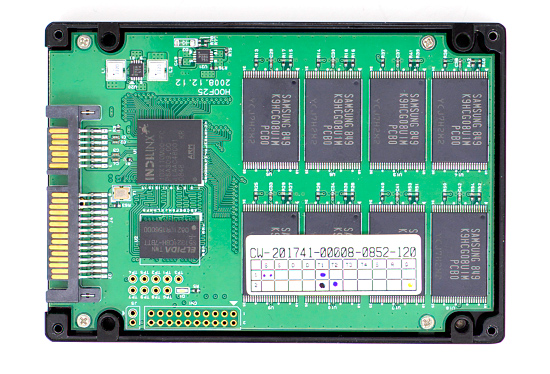
My Vertex used Samsung flash, like all other Indilinx drives
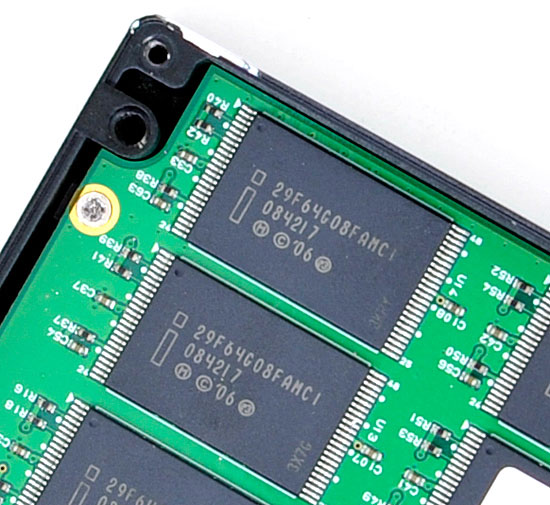
My Agility used Intel's 50nm flash
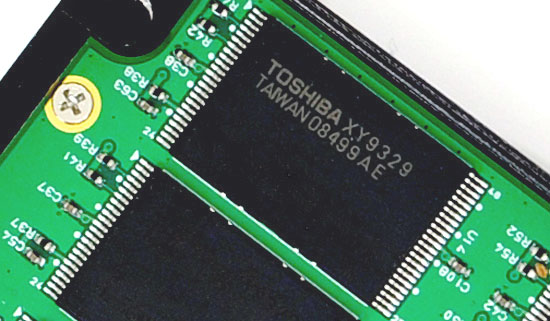
Some lucky Agility owners get Toshiba 40nm flash, which is faster.
The performance is a lower since the flash chips themselves are slower. I'm actually comparing the Vertex Turbo here but my Turbo sample actually runs as fast as most stock Indilinx MLC drives so it provides good reference for an Agility vs. a good Vertex drive:
| Used Performance | OCZ Agility | OCZ Vertex | Vertex Advantage |
| 4KB Random Write | 7.1 MB/s | 7.6 MB/s | 7% |
| 4KB Random Read | 35.9 MB/s | 37.4 MB/s | 4.2% |
| 2MB Sequential Write | 136.3 MB/s | 155.8 MB/s | 14.3% |
| 2MB Sequential Read | 241.3 MB/s | 254.2 MB/s | 5.3% |
| PCMark Vantage Overall | 14468 | 14694 | 1.6% |
| PCMark Vantage HDD | 24293 | 25309 | 4.2% |
The performance ranges from 0 - 5% in the PCMark suite and jumps up to 4 - 14% in the low level tests. The price difference amounts to around 12% for a 128GB drive and 9.5% for a 64GB drive. There's no 256GB Agility.
| OCZ Agility | OCZ Vertex | Price Difference | |
| 64GB | $199.00 | $219.00 | $19 |
| 128GB | $329.00 | $369.00 | $40 |
| 256GB | N/A | $725.00 | N/A |
If you want to make the jump to an SSD and are looking to save every last dollar, the Agility is an option.
I think the Agility line is a great idea from OCZ. I’m not sure about you but personally, as long as the flash is reliable, I don’t care who makes it. And I’m willing to give up a little in the way of performance in order to hit more competitive price points.










295 Comments
View All Comments
sunbear - Monday, August 31, 2009 - link
Even though most laptops are now SATA-300 compatible, the majority are not able to actually exceed SATA-150 transfer speeds according to some people who have tried. I would imagine that sequential read/write performance would be important for swap but the SATA-150 will be the limiting factor for any of the SSD's mentioned in Anand's article in this case.Here's the situation with Thinkpads:
http://blogs.technet.com/keithcombs/archive/2008/1...">http://blogs.technet.com/keithcombs/arc...vo-think...
The new MacBookPro is also limited to SATA-150.
smartins - Tuesday, September 1, 2009 - link
Actually, The ThinkPad T500/T400/W500 are fully SATA-300 compatible, it's only the drives that ship with the machines that are SATA-150 capped.I have a Corsair P64 on my T500 and get an average of 180MB/read which is consistent with all the reviews of this drive.
mczak - Monday, August 31, 2009 - link
article says you shouldn't expect it soon, but I don't think so. Several dealers already list it, though not exactly in stock (http://ht4u.net/preisvergleich/a444071.html)">http://ht4u.net/preisvergleich/a444071.html). Price tag, to say it nicely, is a bit steep though.Seramics - Monday, August 31, 2009 - link
Another great articles from Anandtech. Kudos guys at AT, ur my no. 1 hardware site! Anyway, its really great that we have a really viable competitor to Intel- Indilinx. They really deserve the praise. Now we can buy a non Intel SSD and have no nonsensical stuttering issue! Overall, Intel is still leader but its completely nonsensical how bad their sequential write speed is! I mean, its even slower than a mechanical hard disk! Thats juz not acceptable given the gap in performance is so large and Intel SSD's actually can suffer a significantly worst performance in real world when sequential write speed performance matters. Intel, fix your seq write speed nonsence please!Seramics - Monday, August 31, 2009 - link
Sorry for double post. Its unintentional and i duno how to delete the 2nd post.Seramics - Monday, August 31, 2009 - link
Another great articles from Anandtech. Kudos guys at AT, ur my no. 1 hardware site! Anyway, its really great that we have a really viable competitor to Intel- Indilinx. They really deserve the praise. Now we can buy a non Intel SSD and have no nonsensical stuttering issue! Overall, Intel is still leader but its completely nonsensical how bad their sequential write speed is! I mean, its even slower than a mechanical hard disk! Thats juz not acceptable given the gap in performance is so large and Intel SSD's actually can suffer a significantly worst performance in real world when sequential write speed performance matters. Intel, fix your seq write speed nonsence please!Shadowmaster625 - Monday, August 31, 2009 - link
Subtle. Very subtle. Good article though.3 questions:
1. Is there any way to read the individual page history off the SSD device so I can construct a WinDirStat style graphical representation of the remaining expected life of the flash? Or better yet is there already a program that does this?
2. Suppose I had a 2 gigabyte movie file on my 60gb vertex drive. And suppose I had 40GB of free space. If I were to make 20 copies of that movie file, then delete them all, would that be the same as running Wiper?
3. Any guesses as to which of these drives will perform best when we make the move to SATA-III?
4. (Bonus) What is stopping Intel from buying Indilinx (and pulling their plug)? (Or just pulling their plug without buying them...)
SRSpod - Thursday, September 3, 2009 - link
3. These drives will perform just as they do now when connected to a 6 GBps SATA controller. In order to communicate at the higher speed, both the drive and the controller need to support it. So you'll need new 6 GBps drives to connect to your 6 GBps controller before you'll see any benefit from the new interface.heulenwolf - Monday, August 31, 2009 - link
Yeah, once the technology matures a little more and drives become more commoditized, I'd like to see more features in terms of feedback on drive life, reliability, etc. When I got my refurb Samsung drives from Dell, for example, they could have been on the verge of dying or they could have been almost new. There's no telling. The controller could know exactly where the drive stands, however. Some kind of controller-tracked indication of drive life left would be a feature that might distinguish comparable drives from one another in a crowded marketplace.While they're at it, a tool to allow adjusting of values such as the amount of space not reported to the OS with output in terms of write amplification and predicted drive life would be really nifty.
Sure, its over the top, but we can always hope.
nemitech - Monday, August 31, 2009 - link
I picked up an Agility 120 Gb for $234 last week from ebay ($270 list price - - 6% bing cashback - $20 pay pal discount). I am sure there will be similar deals around black Friday. $2 per Gb is possible for a good SSD.